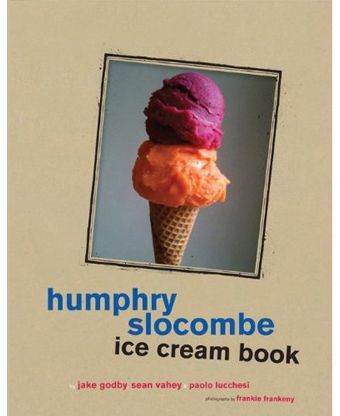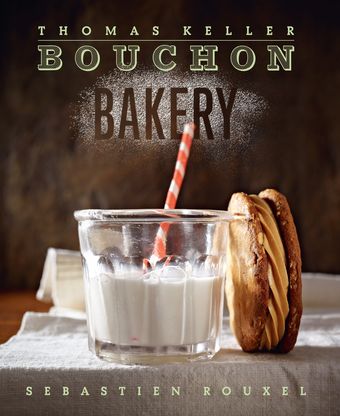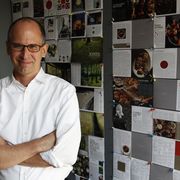Bouchon Bakery and Humphry Slocombe Ice Cream Book. Could there be two, um, more challenging cookbooks for me to judge? I’m a dedicated home cook -- I make dinner every night (okay, at least I strive to), I spend most weekends in my kitchen -- but there are certain foods I always, always outsource to the pros. Baked goods and ice creams top that list. My kind of cooking, the kind that I naturally gravitate toward, is savory and spontaneous -- a pinch of this, a sploosh of that. At least in terms of baked goods and ice creams, it would take the guidance of a very special cookbook for the fruits of my at-home labors to turn out better than what I could easily buy elsewhere.
Thus, it was with grim determination that I approached the Humphry book. All right, I confess: I appreciate any cookbook with photos of actual drag queens in it (see page 124 for an account of something called the “Tranny Smackdown,” an event co-sponsored by Humphry Slocombe, the celebrated San Francisco ice cream shop whose recipes birthed this book), but that sort of whimsy gets a nervous cook only so far. Still, from outward appearances, the book made a good case for itself -- at the very least as a record of a very particular facet in our current gastronomic culture. With Humphry Slocombe, the shop, known for its beyond-oddball ice cream flavors, the book does double duty as a recipe guide and as an atlas of the culinary absurd, with how-tos for flavors such as “Red Hot” Banana (appealing sounding, made with the cinnamon candies) and Strawberry Black Olive (not so appealing sounding, but, hey, never say never).
I don’t own an ice cream maker; in fact, the only time I’d made ice cream before was when I was 12 years old. My dad, an office products salesman, had received an ice cream maker as an end-of-year gift from a client. Our first interaction with the machine was also our last: we churned out a batch of what was allegedly strawberry swirl but in actuality was cement with hard chunks of berries that you could’ve hurt someone with. So I turned to the Saveur test kitchen for help. Judy Haubert, associate kitchen director, and I made two recipes from the book: Tahitian Vanilla as a control, and the vaguely gruesome-sounding Government Cheese as a test of the book’s transgressiveness.
Making the ice creams was pretty straightforward: we started with a custardy base and added flavorings from there. The results were pretty good. The vanilla had a high-fat richness and a real depth of flavor (though it was seriously salty; even five minutes after taking a bite my throat hurt from its saline intensity); the Government Cheese was rich and sweetly savory, only fleetingly cheesy, with a pleasantly autumnal tone from dashes of cinnamon and cayenne. The textures were mighty fine, too. Even after a few days' time sitting in the freezer, the ice creams stayed creamy and scoopable, with none of the angry, hard-brick texture that besets lesser takes on the dessert once they leave the ice cream maker.
If I’m not an ice cream maker, I’m even less a baker. But from the very moment I opened Bouchon Bakery I was inspired and informed. The book is the fifth in Thomas Keller’s unofficial series of cookbooks that also serve as coffee-table books -- they’re gorgeous, with expansive trim size and glossy pages that seem unlikely ever to be batter splattered or sauce stained. That’s not to say they’re not designed to be cooked from -- they are, and the recipes are written with an almost self-parodying degree of precision. But of all Keller’s books (up to and including Under Pressure, his ode to sous vide cookery), Bouchon Bakery is the one that, to me, seems the least easy to cook from. The madeleines, the macarons, the croissants—this is a joke, right? You want me to make croissants?
And yet somehow Bouchon Bakery made me feel I could. Or maybe I could. As I flipped through the massive glossy pages, paralyzing doubt grew inside me. Deciding what to make was an extreme process of elimination. Okay, not the croissants, that holy grail of pastry. English muffins were appealing but maybe too prosaic. I found middle ground with the bacon-cheddar scones. I lined up my ingredients and got to work.
Keller and his co-authors have become famous for the strident attention to detail they bring to their recipes, and that perfectionism was immediately and obviously on display here. But there was also maddening inconsistency to all the micromanaging. One can’t just use any bacon here: It should be “Hobbs applewood-smoked bacon, cooked, drained, and cut into 1/8-inch pieces (77 grams cooked weight).” But the subsequent ingredient is merely listed as 2 cups of “grated white cheddar cheese”—and that's it. How sharp should that cheese be? How big should the holes on my grater be?
Still, while the scones didn’t exactly turn out as tender as promised (the texture was more like a very moist dog biscuit), the taste was incredible, the flavors absolutely perfect. I now worship at the feet of these bacon-cheddar scones. And I will never, ever make them again -- I’ll just go to Bouchon Bakery a little more often than before and buy them. (To be fair, I also made an olive oil cake from Bouchon Bakery, and it was quite good in both flavor and execution.)
At the end of the day, making a judgment between the Bouchon Bakery and the Humphry Slocombe books was, like most things in life, slightly complicated. Both of them are the cookbookizations of popular food shops, whose wares are the sorts of things we (or at least I) don’t usually tend to make at home. They also fit into a larger cultural story, one that now slots “publish a cookbook” somewhere between “get written up on Eater” and “open a branch in Toronto” in the standard growth trajectory of hip, high-quality, media- and tourist-friendly restaurants and purveyors.
So if everyone is putting out a cookbook -- and lately it feels like everyone is -- it becomes especially important for your cookbook to matter, for it to compellingly make the case for its own existence. In one way or another, the food I made from both books turned out acceptable enough. But cookbooks are about far more than cooking these days: they’re about marketing. With its hip affectations and faux-distressed pages, Humphry feels very much of this moment, an amusing and illustrative artifact of 2012. But Bouchon Bakery feels timeless. It’s a record not just of a place and time but of an entire philosophy of baking. If Humphry Slocombe is a sharp, smart, funny YouTube clip, then Bouchon Bakery -- in its overall packaging, its exacting qualities, its occasional contradictions -- is a Paul Thomas Anderson film. Bouchon Bakery deserves the Piglet.



18 Comments